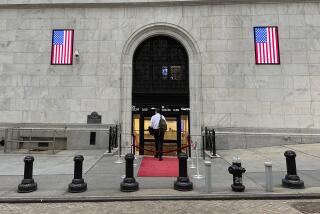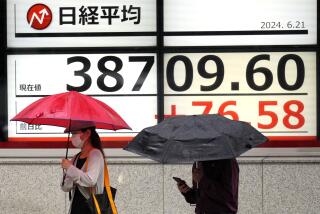Some Analysts See End to Chip-Sector Slump
Only in the semiconductor industry would news of the biggest sales drop in history be cause for celebration.
This week, the industry’s main trade group said worldwide revenue in June fell more than 8% from May and more than 30% from a year earlier, to $11.6 billion. That puts chip sales back to July 1999 levels.
Chips are used in everything from PCs to cell phones, hand-held computers and other technology hardware, and since last winter all those markets have slowed dramatically.
Several Wall Street analysts declared that since the falloff was so severe, the end of the trough must be coming. They recommended that clients load up on shares of chip makers such as Texas Instruments and Taiwan Semiconductor Manufacturing.
As a result, the Philadelphia semiconductor index of 16 major chip stocks, known as the SOX index, rose 6.5% for the week and hit a two-month high. The index still is down about 50% from its March 2000 peak.
But some longtime industry watchers say the enthusiasm is highly speculative. Chip stock prices already anticipate a robust comeback, there is nothing on the technology horizon like the dot-com boom, and the overall economy remains uncertain.
The reasoning behind the recent recommendation upgrades by analysts is that the market for chips is wildly cyclical.
Chip manufacturing plants cost $1.5 billion or more to build and take time to construct. When demand is high, makers of PC microprocessors, memory components, and communications and other chips invest like crazy.
Soon after all the new facilities’ capacity comes on line, the market is flooded, prices plummet, and revenue and profit fall in a vicious boom-and-bust pattern.
Because stock prices track revenue and profit in the industry, the shares are among the most volatile in any type of manufacturing.
“Although the semiconductor industry continues to struggle with a combination of overcapacity and weak demand, we believe that the worst of the downturn is now behind us,” a team of Merrill Lynch analysts wrote this week.
They cited a reduction in the stockpile of unsold chips and cuts in capital spending on new plants and equipment, which will ease the product glut.
Profit at Santa Clara, Calif.-based Intel Corp., the largest chip manufacturer, plunged 94% in the second quarter as sales fell 24% to $6.3 billion. But the company predicts sales will pick up in the second half.
Many investors have held their shares in makers of chips and related equipment through the profit slump, keeping the SOX index at a lofty price-to-earnings ratio of almost 100 based on estimated 2001 earnings, about five times the estimated P/E of the Standard & Poor’s 500 index.
“Even as the [chip] stocks came down, there’s always been some optimism there,” said principal analyst Linley Gwennap of the Linley Group. “Technology is a good thing to have in the long run. The Internet is still going to be built out.”
But high valuations on chip stocks give others pause.
“We had one hell of a party, and this hangover hasn’t really been acknowledged yet,” said CS First Boston analyst Charles Glavin. “The valuations make it sound like it’s a quick fix.”
And compared with previous chip-industry recoveries, even bulls say the next one has many more uncertainties.
The first is timing. Chip demand has been so weak that even slashing prices hasn’t resulted in enough volume to keep the factories humming.
“Over a quarter of the [chip making] capacity is still unused,” Glavin said. “Couple that with an economic slowdown and a weaker demand . . . it’s premature to say that a recovery is imminent.”
Business may pick up in the fourth quarter, aided by PC sales from Microsoft Corp.’s new Windows XP operating system and Intel’s Pentium IV chip, the Semiconductor Industry Assn. predicts.
But that sales bump may flatten in the first quarter, Gwennap and others said.
The most significant uncertainty is the intensity of the comeback.
No one expects personal computer sales to create a chip demand the way it once did. This year total sales of desktop computers are expected to suffer their first year-to-year decline in two decades.
(BEGIN TEXT OF INFOBOX / INFOGRAPHIC)
Chip Stocks
The semiconductor industry is struggling as cell phone and PC sales continue to slump. Some investors see the chip market improving by year’s end, but many wonder when the technology rebound will finally kick in. Two key semiconductor stocks:
*
AMD (Monthly closes and latest)
Friday: $19.25, down 51 cents
*
Intel (Monthly closes and latest)
Friday: $31.68, down 43 cents
Source: Bloomberg News






